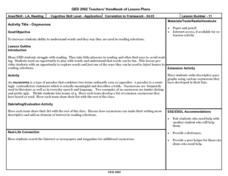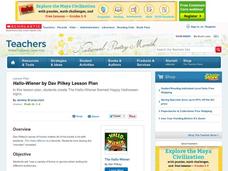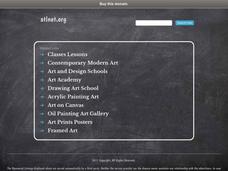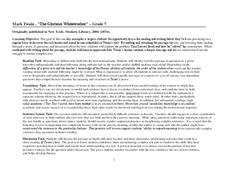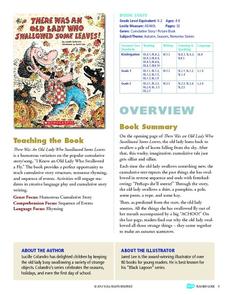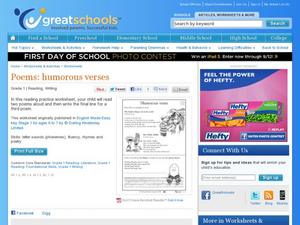Curated OER
Funny or Not - Your Opinion
Students interpret and judge the meaning of a political cartoon. They dicuss the cartoons in groups and write an evaluative paragraph which they present to the class.
Curated OER
Autobiography
Sixth graders read and write autobiographical sketches, determine the author's purpose in writing, and type paragraphs using WP utilities.
Curated OER
What's Up with Waste?
Fifth graders design a brochure that identifies types of solid waste that are often improperly disposed, explains the effects of this disposal and proposes a solution to the problem. The read humorous books, define vocabulary words and...
Curated OER
Show and Teach
Second graders write "how to" sequences for tasks so that another person can follow the sequence to perform the action. They write a "show and teach" once a month for evaluation.
Curated OER
Oxymorons
Twelfth graders explore the use of oxymorons in everyday speech and writing. In small groups, 12th graders develop a list of common oxymorons they have heard or read to present to the class, and search the Internet for additional oxymorons.
Curated OER
Hallo-Wiener Lesson Plan
Learners listen to the story The Hallo-Wiener by Dav Pilkey in order to learn about the "monster" character. In this reading and art lesson, students cut a "bun" from beige construction paper, cut out an image of the main character...
Curated OER
Career Biographies
Students choose an occupation that they would like to pursue and write a career biography that outlines the path they would need to follow to achieve their goals.
Curated OER
View the News with a Parent
Learners view local television news programs with their parents to analyze content and discuss current isues. They write with their parents comments on their discussion to be later shared in class..
Curated OER
Test Your Vocabulary Skills- Abstract Nouns 2
In this vocabulary worksheet, students recall that an abstract noun is a noun that does not have a physical form. Students write a matching abstract noun for a list of twenty adjectives.
Curated OER
The Font of Funniness
Students research the work of a contemporary humorist by analyzing a variety of pieces of their work. They look at the work from a variety of media sources such as writing, videos, and broadcasts to decide how "American" the material is....
Curated OER
Musher Graphing and Probability
Learners use the internet to research statistical information on the musher dogs participating in the Iditarod. Using the data, they create three different types of pie charts. They use the charts to answer questions about the dogs. They...
Curated OER
The Air Up There
Pupils engage in a lesson that is concerned with the average daily weather patterns. They collect data over a five day period and then write a summary of the observations made from it. Students record the mean and graph it on a simple...
Curated OER
Syber-Silverstein: Poetry in Motion
Sixth graders explore the writing of Shel Silverstein. They listen to the story, The Giving Tree, explore the Shel Silverstein website, read poems, and create and write a humorous poem.
Curated OER
Story Starter- A Bath In The Dog's Water Bowl
In this writing worksheet, students examine a humorous picture depicting a bird taking a bath in a dog's water bowl. Students read the story starter and finish the story.
Curated OER
Are You Money Smart?
Learners figure out and discuss the irony of this coin-centric poem. They also practice persuasive letter writing, and identify and count coin/money values.
Curated OER
The Glorious Whitewasher
Young readers can be exposed to the literary works of Mark Twain as they interact with challenging text and gain experience by reading the complex passages of chapter two "The Glorious Whitewasher" from his famous book, The Adventures of...
Curated OER
There Was An Old Lady Who Swallowed Some Leaves Storia Teaching Guide
There was an old lady who swallowed some leaves? Little learners read a new version of the old swallow story with a fall twist as they try to answer the big question; Why is that lady swallowing all that weird stuff? The teacher's guide...
Curated OER
Tone and Mood
How are mood and tone similar? Different? Help your readers understand the difference between the two with this helpful guide. On the first page, they read the definition for both tone and mood and identify words that are describe each....
Curated OER
Capturing the Reader With Vivid Images
Students examine the use of imagery to hold a reader's attention in an excerpt from John Deever's memoir "Mr. John and the Day of Knowledge". They are introduced to background information about the Ukraine and create original imagery.
Star Wars in the Classroom
"Shakespeare and Star Wars": Lesson Plan Day 3
To make the point that there are many forms of language, each with its own purpose, class members select 10 lines from Doescher's play, translate these lines first into contemporary English and then into "SMS/Tweet."
Curated OER
Poems: Humourous Verses
First grade is a great time to build strong reading skills. Here are three short rhyming poems or common nursery rhymes that are intended to help boost reading fluency. Because most children know these rhymes, they will have an easier...
K12 Reader
Synonym Circus
After matching 13 words with a list of synonyms, kids craft a short paragraph about the circus using the provided synonyms.
Curated OER
Satire and The Adventures of Huckleberry Finn
Does Mark Twain’s satire become sarcasm and does he cross the line of propriety in The Adventures of Huckleberry Finn? As an introduction of satire, class members view an excerpt from The Daily Show and discuss Stewart's use of this...
Chandler Unified School District
Satire: The Art of Indirect Persuasion
A free press is entitled to its opinions. While the news pages report the facts of events, editorial pages feature writers' and cartoonists' opinions about events to either directly or indirectly persuade. Introduce viewers to the art of...






